新概念英语第一册lesson91-92
- 格式:ppt
- 大小:2.13 MB
- 文档页数:30
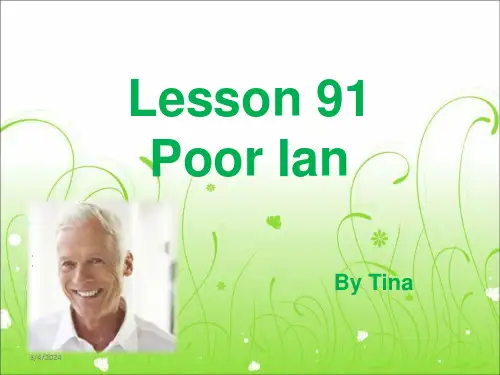
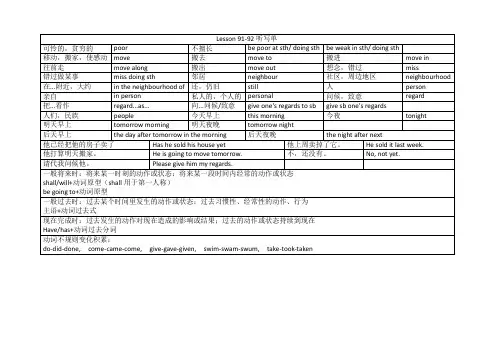
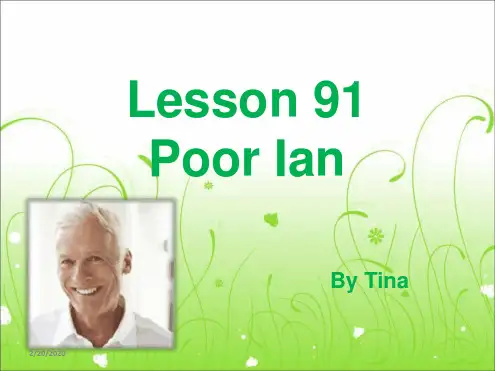
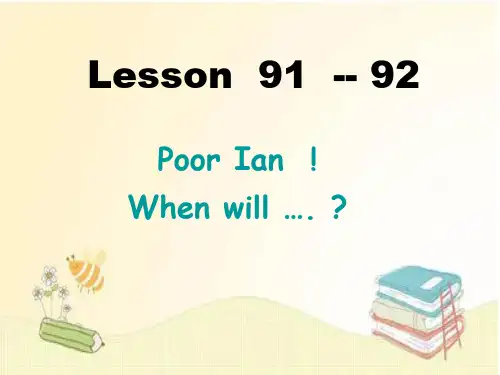
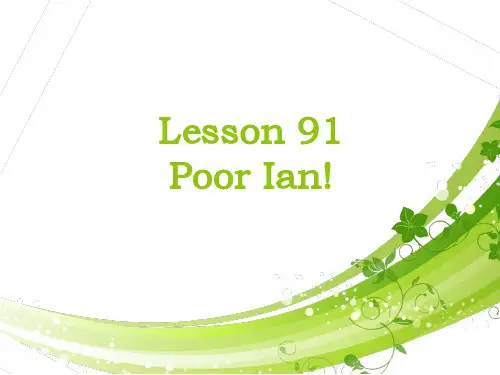
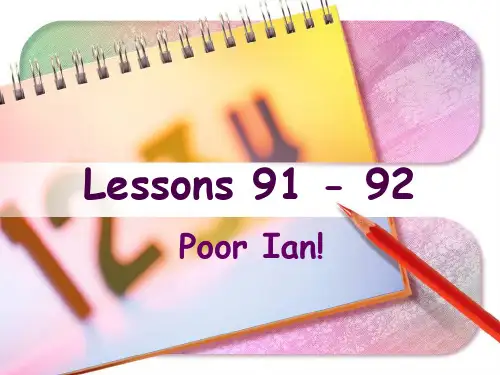
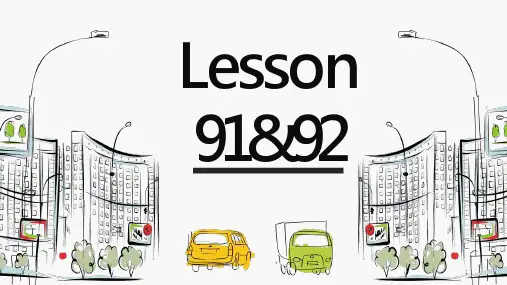

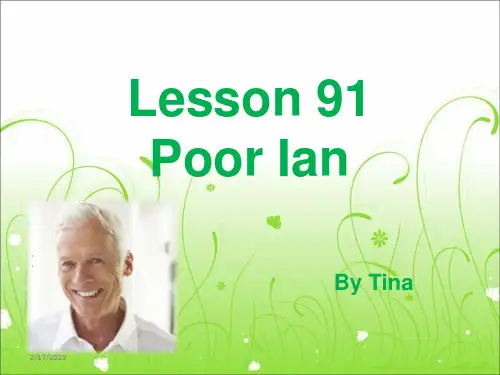
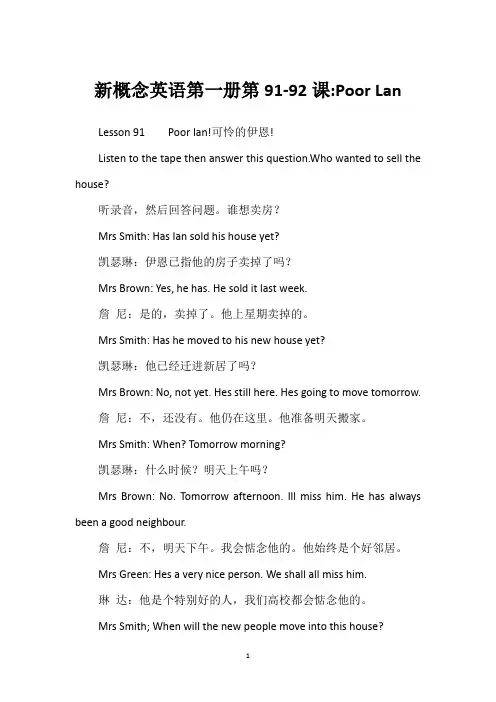
新概念英语第一册第91-92课:Poor LanLesson 91 Poor Ian!可怜的伊恩!Listen to the tape then answer this question.Who wanted to sell the house?听录音,然后回答问题。
谁想卖房?Mrs Smith: Has Ian sold his house yet?凯瑟琳:伊恩已指他的房子卖掉了吗?Mrs Brown: Yes, he has. He sold it last week.詹尼:是的,卖掉了。
他上星期卖掉的。
Mrs Smith: Has he moved to his new house yet?凯瑟琳:他已经迁进新居了吗?Mrs Brown: No, not yet. Hes still here. Hes going to move tomorrow.詹尼:不,还没有。
他仍在这里。
他准备明天搬家。
Mrs Smith: When? Tomorrow morning?凯瑟琳:什么时候?明天上午吗?Mrs Brown: No. Tomorrow afternoon. Ill miss him. He has always been a good neighbour.詹尼:不,明天下午。
我会惦念他的。
他始终是个好邻居。
Mrs Green: Hes a very nice person. We shall all miss him.琳达:他是个特别好的人,我们高校都会惦念他的。
Mrs Smith; When will the new people move into this house?凯瑟琳:新住户什么时候搬进这所房子?Mrs Brown: I think that they will move in the day after tomorrow.詹尼:我想他们将会在后天搬进来吧。
Mrs Green: Will you see Lan today, Mrs Brown?琳达:詹尼,您今日会见到伊恩吗?Mrs Brown: Yes, I will.詹尼:是的,我会见到他。
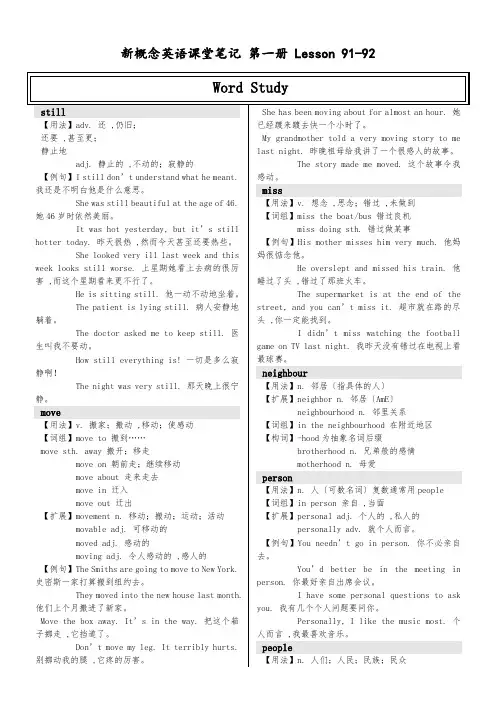
新概念英语课堂笔记第一册 Lesson 91-92【讲解】people作“人们〞讲时为集体名词 ,本身即为复数。
作“人民〞讲时 ,也是集体名词 ,其前一般加the。
作“民族〞讲时是可数名词 ,有复数形式 ,也可与a连用。
people常用于指大批人或不精确说明人数的场合;而person一般用于指烧炼的人或精确说明人数的场合。
some people一些人;two persons两个人。
【例句】There are lot of people on the street. 那条街上人很多。
The government must depend on the people. 政府必须依靠人民。
There are 56 peoples in China. 中国有56个民族。
poor【用法】adj. 可怜的;贫穷的;差的【词组】the poor 穷人【例句】The wine was poor. 这葡萄酒很劣质。
I feel sorry for that poor child. 我为那个可怜的孩子感到难过。
My spoken English is poor. 我口语很差。
NamesCatherine /ˈkæθərin/ 奈杰尔〔男子名〕Jenney /ˈdʒeni/ 詹尼〔男子名〕Linda /'lɪndə/ 琳达【译文】他一直都是个好邻居。
【用法】○1本句是用现在完成时表达一般现在时的含义 ,如此处用一般现在时 ,那么语气就比拟平淡。
○2 neighbour是一个具体名词 ,用来表示邻居;而neighbourhood是一个抽象名词 ,用来表示邻里关系。
I think that they’ll move in the day after tomorrow.【译文】我想他们将在后天搬进来吧。
【用法】○1 I think 后面加了一个宾语从句 ,由that引导:that they’ll move in the day after tomorrow.○2 move in“搬进去〞 ,此处in为副词 ,因其后没有宾语。
Lesson 91 ~ 92 Poor Ian!◆ 词汇详解(1) still adv. 还,仍旧e.g. He is still here. 他还在这里。
(2) move v. 搬家,移动move to/into sp. 搬到某地e.g. We will move into a bigger house soon.我们马上要搬进一幢更大的房子。
常用搭配:move into !" move out of(3) miss v. 思念e.g. Will you miss me? 你会想我吗?词义扩展:miss还可解释为错过e.g. He overslept and missed the train. 他睡过头错过了火车。
(4) neighbour n. 邻居= neighbor (AmE)e.g. 一个好的邻居就像一个好朋友。
A good neighbour is like a good friend.词汇衍生:neighbourhood 街坊,四邻(5) person n. 人people n. 人们【学生版不出现】person人VS. people 人们person一般特指某个人,具有某种特指:He is a very nice person.people一般为person的复数,即more than one person(6) poor adj. 可怜的e.g. Poor kid, it’s a sad day for him. 可怜的孩子,这真是悲伤的一天。
词意扩展:poor还可以解释贫穷的,反义词为rich◆ 课文解析之经典例句(1) He has always been a good neighbour.#结构:现在完成时,强调他“一直以来”,变为一般现在时为:He is always a good neighbour.#注意always位置:用在助动词have/has后,过去分词前。
Lesson 91 单词讲解1.still: adv.还,仍旧情系后,实义前He is still there.I still stay in Beijing.2.move: v.搬家move to… She moved to New York last year.move into… He has moved into the house.3.miss: v.想念,思念4.neighbour: n.邻居neighbor (美式)5.person: n.人VIP- a very important person6.people: n.人们A. 谓语动词用复数There were many people in the classroom.B. 泛指人们People do not know the value of health till theylose it. 直到失去健康,人们才知道健康的可贵。
C. the+ people, 人民My duty is to serve the people.7. poor: 可怜的Lesson 91 课文讲解1. Has… sold his house yet?Yes, he has.He sold it last week.2. Not yet.He has not moved to his new house yet.Have you got married? – Not yet.Have you finished your work? – Not yet.3. He is going to move tomorrow.他打算明天搬家。
明天早晨:tomorrow morning明天下午:tomorrow afternoon明天晚上:tomorrow evening明天夜里:tomorrow night后天:the day after tomorrow后天早晨:the day after tomorrow in the morning后天下午:the day after tomorrow in the afternoon后天晚上:the day after tomorrow in the evening后天夜里:the night after next4. I’ll miss him.I’ll= I will…5. He has always been…主语+ have/has+ been+ 非动词a. 她一直以来都很漂亮。